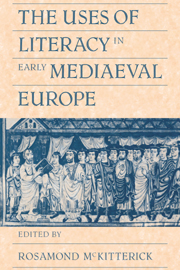Book contents
- Frontmatter
- Contents
- List of illustrations
- Contributors
- Preface
- Abbreviations
- Introduction
- 1 Literacy in Ireland: the evidence of the Patrick dossier in the Book of Armagh
- 2 Anglo-Saxon lay society and the written word
- 3 Administration, law and culture in Merovingian Gaul
- 4 Literacy and the papal government in late antiquity and the early middle ages
- 5 Literacy and the laity in early mediaeval Spain
- 6 Aspects of mediaeval Jewish literacy
- 7 Writing in early mediaeval Byzantium
- 8 Literacy displayed: the use of inscriptions at the monastery of San Vincenzo al Volturno in the early ninth century
- 9 Royal government and the written word in late Anglo-Saxon England
- 10 Literacy in Carolingian government
- 11 Text and image in the Carolingian world
- Conclusion
- Index
6 - Aspects of mediaeval Jewish literacy
Published online by Cambridge University Press: 07 December 2009
- Frontmatter
- Contents
- List of illustrations
- Contributors
- Preface
- Abbreviations
- Introduction
- 1 Literacy in Ireland: the evidence of the Patrick dossier in the Book of Armagh
- 2 Anglo-Saxon lay society and the written word
- 3 Administration, law and culture in Merovingian Gaul
- 4 Literacy and the papal government in late antiquity and the early middle ages
- 5 Literacy and the laity in early mediaeval Spain
- 6 Aspects of mediaeval Jewish literacy
- 7 Writing in early mediaeval Byzantium
- 8 Literacy displayed: the use of inscriptions at the monastery of San Vincenzo al Volturno in the early ninth century
- 9 Royal government and the written word in late Anglo-Saxon England
- 10 Literacy in Carolingian government
- 11 Text and image in the Carolingian world
- Conclusion
- Index
Summary
The purpose of this essay is twofold. Unlike the remainder of the contributions, it sets out to describe cultural developments that occurred within a non-Christian tradition and that seem first to have flourished in an environment dominated by Islam. The geographical area in question ranges from Muslim Spain, through North Africa, Egypt and the Syro-Palestinian territories, to what is today Iraq and Iran, and the chronological limits are from the sixth to the eleventh centuries of the Christian era. This departure from Europe for more oriental climes is not a matter of scholarly choice but is dictated by a dearth of evidence in that continent for the chronological span just defined that frustrates current research and contrasts with the wealth of sources emanating from the Jewish communities of the Arab world. The description here being offered will serve to complement the other essays not only by providing an external yardstick against which to measure the significance of literary trends in the world of European Christianity but also by drawing attention to certain parallel developments, the accurate evaluation of which will become possible only when scholarly research increases knowledge of the beginnings of Jewish settlement in Christian Europe. Its second aim, which has more in common with the other subjects treated in the volume, is to assess the degree to which literacy penetrated various societies around the Mediterranean area and to the east of it in the latter half of the first Christian millennium and thereby to dispel some of the myths that have led to the overall representation of that period in terms of ‘the dark ages’.
- Type
- Chapter
- Information
- The Uses of Literacy in Early Mediaeval Europe , pp. 134 - 155Publisher: Cambridge University PressPrint publication year: 1990
- 2
- Cited by



